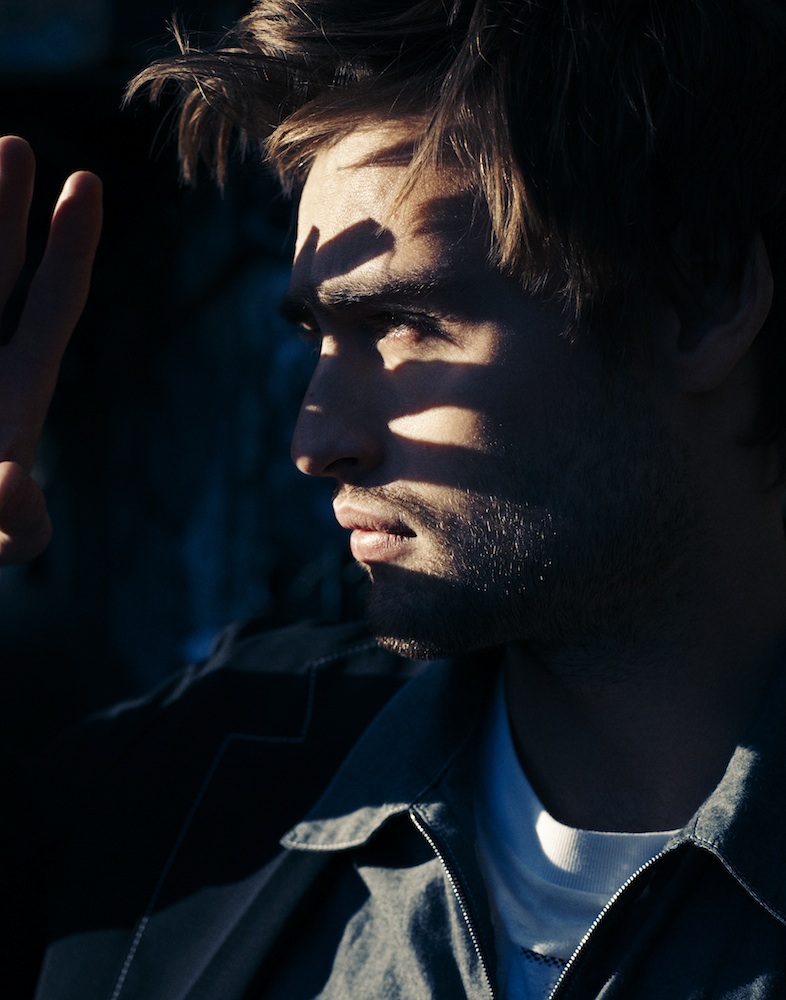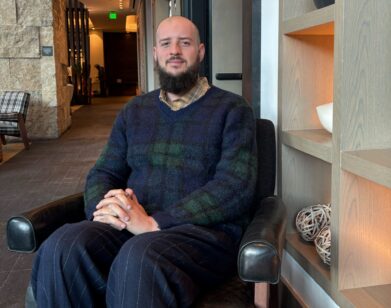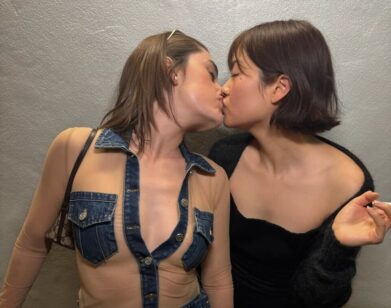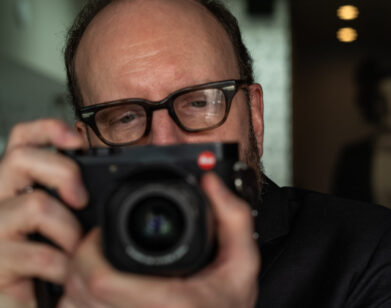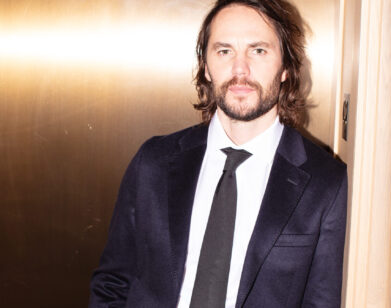Mr. Booth’s Mr. Bingley
DOUGLAS BOOTH AT F.COOKE CAFE, BROADWAY MARKET, LONDON, JANUARY 2016. PHOTOS: MATT HOLYOAK/KAYTE ELLIS AGENCY. STYLING: NIC JOTTKANDT. GROOMING: LEE MACHIN/CAREN USING TOM FORD GROOMING.PHOTO ASSISTANT: LUKE WELLER. STYLING ASSISTANT: JULIA LURIE.RETOUCHING: THE SHOEMAKER’S ELVES.
“It is a truth universally acknowledged that a zombie in possession of brains must be in want of more brains.”
The premise of Pride and Prejudice and Zombies, the new film from director Burr Steers, is self-explanatory. Based on the book by Seth Grahame-Smith, which is, of course, based on Jane Austen’s classic 1813 novel, the film hits all of Austen’s major plot points with the added urgency of a zombie plague engulfing England. Heroine Elizabeth Bennett (Lily James) isn’t just an independent, intelligent young woman who likes to go for five-mile walks and could never marry someone whom she didn’t respect; she’s also a skilled swordswoman and fluent in Chinese. Mr. Darcy (Sam Riley) is a professional zombie hunter, and his arrogant aunt Lady Catherine de Bourgh (Lena Headey) is the greatest zombie slayer of them all.
Not everyone in Hertfordshire is a self-sufficient fighter, however. Mr. Bingley, Darcy’s best friend, is particularly useless. “He’s not the best,” laughs Douglas Booth, who plays Bingley in the film. “[But] I was coming off Jupiter Ascending and The Riot Club, having played not so great characters, so was it refreshing to play such a lovable character. He’s a kind-hearted guy with such good intentions, but he’s a bit hapless and helpless,” the British actor continues. “It was fun coming to work and knowing all you had to do was just get on with everyone and be really amiable.”
Now 23, Booth started acting professionally at the age of 16. It’s tempting to dismiss him as a heartthrob, but Booth has never coasted on his looks. He’s a talented actor who isn’t afraid to take on risky projects. His breakout role was playing Boy George in 2010’s Worried About the Boy, and he has since worked with Darren Aronofsky (Noah), the Wachowski siblings (Jupiter Ascending), and Lone Scherfig (The Riot Club). “You’ve got to just take a punt on some things,” he says. “Some things work, some things don’t.”
Next up, Booth will appear in Loving Vincent alongside Chris O’Dowd and Saoirse Ronan as one of Vincent Van Gogh’s subjects Armand Roulin. He will also star in an adaptation of Peter Akroyd’s novel The Limehouse Golem as Dan Leno, a real-life music hall performer. “He had a troubled life, he died an alcoholic and put himself into an asylum before his death,” says Booth of his character. “I had lots of fun playing him, changing my appearance, putting in different teeth.” Soon, he’ll fly to Dublin to play poet Percy Shelley in A Storm in the Stars.
In addition to acting, Booth is a strong supporter of the UN’s Refugee Agency (UNHRC) and Emma Watson’s #HeforShe campaign.
EMMA BROWN: I saw that you did 75 interviews in one day.
DOUGLAS BOOTH: Yeah, I was ready to expire by the end of it. But it’s been so much fun on this press tour because it’s been with a bunch of friends.
BROWN: Is that quite usual for you? I know you said the cast of The Riot Club all became friends as well.
BOOTH: Yeah, it was a similar experience, and it really makes going to work so much easier. But this was cool because we had not just a group of boys, but a group of extremely powerful, independent women kicking ass. It was a completely different experience. It was actually really lovely to be around after being on such a heavy, misogynistic set—the characters, not the actual actors—to turn that on its head and to be in a movie that’s all about women and girl power. It was great to see these characters who traditionally have had all of their frustrations and worries pent up inside, rather than just writing in a diary and talking about it, they could really externalize it and pull out a sword and prove themselves.
BROWN: Have you been doing back-to-back films for the past three years or have you gotten to take a break?
BOOTH: It’s really important to take time for yourself because if you don’t know what it is like to be a real person and spend time with a sense of normality, how can you play normal people in films? A couple of weeks ago over Christmas and the New Year I was in India. We went to Goa and Kerala on New Year’s Eve, 30 of us. It was pretty special. Matt [Smith] and Lily [James] were on holiday with us too, part of the group. It was wonderful.
BROWN: You already knew Lily before filming, right? Did you know anyone else?
BOOTH: I worked with Matt before on a biopic of Christopher Isherwood. He was playing Christopher Isherwood and I actually played a young guy called Heinz Neddermeyer, who he took under his wing, and they sort of had a relationship. So I’d known Matt since I was 17. Lily, I’d seen her in some of her early drama school shows because we have a mutual best friend in Freddie Fox, who she went to drama school with. I was in Worried About the Boy with Fred, so I’ve known her for a long time as well.
I did know Sam Riley. I’d met Jack Huston briefly. Charles Dance I worked with on And Then There Were None, but I filmed that afterwards. I’d met Suki [Waterhouse] before. Millie Brady and Ellie Bamber were new additions. They’re so much fun. Such great girls.
BROWN: Did you know that Matt and Lily were going to be involved in the film?
BOOTH: Matt hadn’t quite signed on and Lena was just jumping on board as well. Matt called me and said he would play the part of Collins if the director let him play him as if he was in love with Darcy, which I think turned out quite funny for the film. We both jumped on at the same time.
BROWN: Were you familiar with the director Burr Steers before the film? I love Igby Goes Down.
BOOTH: Igby Goes Down is a really good film. It’s completely mad. I think it’s probably partly based on Burr’s childhood. He grew up in that bizarre WASPy world. I loved 17 Again as well, I thought that was quite an entertaining film. He knows how to make interesting stuff like Igby Goes Down as well as a great, fun, commercial film like 17 Again. A guilty pleasure for sure.
BROWN: I wanted to talk about Loving Vincent as well. Is it animated?
BOOTH: This is the world’s first-ever painted animation. You film it like a normal film—Saoirse Ronan, Aidan Turner, Chris O’Dowd, and all the wonderful people who are in it. It was mostly studio based, so built sets. Because we were shooting very quickly, we’d go from one side of the studio to the other side constantly. You film it like a normal film, and then they project every single frame of the movie onto a canvas, and the artist traces over each frame in the style of Van Gogh. I think it’s 12 frames per second, so for every second of the movie there will be 12 different oil paintings. There are around 60,000 or more oil paintings making up the movie. I’ve baggsied one.
BROWN: That must take ages. When will they finish?
BOOTH: It’s taken just over a year, I think. They started with 80 painters and now they have over 100 painting every day. They had to audition each painter like you’d audition an actor, because they have a very high standard and it’s a tricky thing to do. It’s not just an artistic impression—you have to have the style of Van Gogh. When you see each character for the first time they appear for a split second—if you blink, you miss it—as they appeared in Van Gogh’s original painting. In scenes throughout the whole movie, his paintings appear for a split second. His paintings are all in there, without it being shoved in your face.
They’re genius directors and producers. They did a short, part-stop motion, part-traditional animation, which they won an Oscar for. [But painted animation] had never been done before really. There’s been a short, but nobody’s ever done a feature. They basically invented the technology they needed to do it. It’s quite remarkable; I’m just thrilled to be a part of it. I play Armand Roulin, who’s a young guy who takes you through the story and visits all the other characters in it. He’s painted by Vincent, and his dad is the postman, who was good friends with Vincent. After his death the postman thinks there’s something strange about how he died, so he sends his son to deliver an undelivered letter to Vincent’s family, and in the process of this he finds out a bit more about his death. For Armand, it’s a coming of age. He didn’t really have any respect for Vincent—he thought he was a bit of a nutter when he was alive—and through his journey he discovers what a great and misunderstood man he was.
BROWN: You’ve been acting for a long time, and you’ve worked on some really interesting projects. Have you ever done anything, or been tempted to do anything, just for the exposure?
BOOTH: Not really. When I took Jupiter Ascending, I had the opportunity to do that or one of the major YA franchises that are out right now. At the time, I asked Darren Aronofsky, “Do I work with the Wachowskis on this mad project, which I haven’t properly read the script for yet, or do I do this YA thing?” And he said, “Work with the Wachowskis.” I’m 23 and I’m very, very lucky to have worked with the people I’ve worked with. I’m just trying to choose interesting, quirky projects or things with interesting directors or just movies that have a lot of people I like attached to them so I know I’m going to have a good time. What is life unless you’re having a good time? I don’t really have a plan; I just try to dip my toes in different ponds.
BROWN: Do you have a list of people you want to work with?
BOOTH: Oh massively. I’d love to work with Paul Thomas Anderson or Quentin Tarantino, but these are dreams I don’t need to rush to achieve. I’ll be ready to make those movies when I’m ready to make those movies and they’re ready to make them with me, if they ever want to.
BROWN: When you’re on the fence about a project, or have to decide between two different projects, is there someone in particular you talk to?
BOOTH: You have your managers and your agents. You have your mother. You get a feel for it. I remember Lone Scherfig saying to me, you can have a great script, or a great director and a bad script, and get a great movie. Nothing really guarantees anything. The script’s always important, but there are some things that have come out in the past year that, when we read them, everyone was like, “Oh my god, this is going to be the next best thing!” Then the movie falls completely flat on its face. Sometimes things are nothing on paper, but a genius director turns it into something amazing. More often than not, if you’ve got a good director and a good script you can’t really go wrong.
BROWN: How did you get involved with the UN?
BOOTH: I asked myself this same question, and I asked my mum as well, “Why am I gravitating towards this?” I think the answer is that I’ve always had a social awareness. My favorite channel on TV is BBC News 24. For a while, I had to have it on repeat in my house. I’ve always been interested in what’s going on in the world. Some people can very easily switch off and be guilt free, not that what I’m doing is about guilt, but they can completely disconnect and not care because it doesn’t affect them. I’ve always really cared about what happens and felt a certain responsibility. I was attached for a while to a movie about this guy called Dan Eldon, who was a really amazing photojournalist and artist. A woman who works at the UNHCR was a big fan of him as well, and she saw I was attached to the movie and we got talking, and through that I got involved.
BROWN: Has it been what you thought it was going to be?
BOOTH: No, it’s completely opened my eyes. It’s changed my life. Going over to Lesvos in Greece and meeting some of these poor refugees who have just made the treacherous sea crossing opened my eyes in a way I can’t even being to describe. It’s put a fire in my belly to really try to do something, the little I can do.
BROWN: Does it make you see London differently?
BOOTH: I suppose to a certain degree. London’s my favorite place on the planet and the reason for that is its fantastic diversity. I suppose I look at people and think about the journeys that their parents may have made to get them here. I think about the journey my grandparents made—my grandparents are immigrants from Spain and Holland, so it’s not quite the same, but I think about what pushed them out of their countries and how fortunate I am to grow up here and to not take that for granted.
PRIDE AND PREJUDICE AND ZOMBIES COMES OUT TOMORROW, FEBRUARY 5, 2016.

